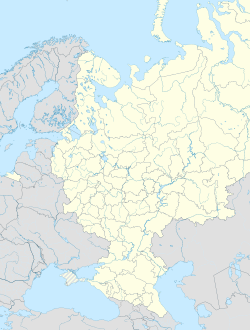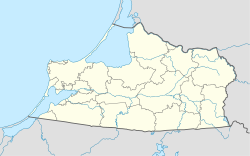Jablonowka (Kaliningrad, Osjorsk)
| settlement
Jablonowka / Wilhelmsberg
Яблоновка
|
||||||||||||||||||||||
|
||||||||||||||||||||||
|
||||||||||||||||||||||
Jablonowka ( Russian Яблоновка , German Wilhelmsberg , lit. Jablonovka) is a place in the Russian Oblast Kaliningrad . It is the administrative seat of the Gawrilowskoje selskoje posselenije (rural community Gawrilowo ( Gawaiten , 1938–1946 Herzogsrode )) in Osjorsk district ( Darkehmen district , 1938–1946 Angerapp ).
Geographical location
Jablonowka is east of Osjorsk ( Darkehmen , 1938-1946 Angerapp ) on a side road that connects the Rajons capital (10 kilometers) with Gawrilowo ( Gawaiten , 1938-1946 Herzogsrode , 6 kilometers). There is no rail connection.
The Raslivnaya ( Friedrichsberger Fliess ) river runs through Jablonowka and flows into the Wika ( Wiek ) after a few kilometers .
history
The village, once called Kiklutzen near Gawaiten and later Wilhelmsberg , counted - besides the Wilhelmsberg manor district - 51 inhabitants in 1910. Their number rose to 186 by 1925, in 1933 - after the incorporation of the manor district - already 553 and rose to 579 by 1939. Until 1945 Wilhelmsberg belonged to the Darkehmen district (1938–1946 Angerapp ) in the Gumbinnen administrative district of the Prussian province of East Prussia .
After the Second World War , Wilhelmsberg came to the Soviet Union with the north-east Prussian area and was renamed Jablonowka in 1946 . Until 2009 the place belonged to the Gawrilowski soviet (Dorfsovjet Gawrilowo) ( Gawaiten , 1938-1946 Herzogsrode ) and was then reclassified into the Gawrilowskoje selskoje posselenije (rural community Gawrilowo). This is part of the Osjorsk Raion in the - now Russian - Kaliningrad Oblast .
Wilhelmsberg district
Between 1874 and 1945, Wilhelmsberg was the seat and eponymous place of an administrative district . This was formed on May 6, 1874 from eleven rural communities or manor districts:
| Name (until 1938) | Name (1938-1946) | Name (since 1946) | Remarks |
|---|---|---|---|
| Rural communities : | |||
| Cell lines | Kellmen | Krasny Bor | belonged to nobleman Pogrimmen |
| Kermuschienen | Fritzenau | Porkhovskoye | |
| (Royal) Pogrimmen | Grim | Pskovskoye | |
| Rough beans | Murmur | Volkovo | |
| Szameitschen, 1936–1938: Schameitschen (Ksp. Wilhelmsberg) |
Brahmannsdorf | Solnechnoye |
1928 incorporated into the rural community of Wilhelmsberg |
| Wilhelmsberg (village) | Wilhelmsberg | Jablonowka | |
| Manor districts : | |||
| Noble Pogrimmen | - | - |
1928 incorporated into the rural community of Pogrimmen |
| Brindlacken | Kleinfritzenau | Prudnoye |
1928 incorporated into the rural community of Kermuschienen |
| Friedrichsberg | Friedrichsberg | Pskovskoye | from 1925 rural community |
| Königsfelde | Königsfelde | Novo-Slavyanskoye |
1928 incorporated into the rural community of Wilhelmsberg |
| Wilhelmsberg | Wilhelmsberg (good) | Slav cinema |
1928 incorporated into the rural community of Wilhelmsberg |
church
Church building
In 1724 King Friedrich Wilhelm I ordered a church to be built in Wilhelmsberg, which was inaugurated in 1725. It was built from field stones and was renovated in 1828/29. On the occasion of a church visit in 1910 it was found that the church lacks a tower. The community wanted to build it, but received no confirmation from the government.
The Wilhelmsberg church was designed from the start as a simultaneous church in which both Evangelical Lutheran and Evangelical Reformed services were celebrated.
The church building survived the Second World War and is still standing today. Admittedly, it was misappropriated during the Soviet Union and used as a grain drying plant until 1994. The lattice tower is no longer there, the doors and windows boarded up. Today the former church is empty.
Parish
Before the devastating plague with numerous deaths between 1709 and 1711, the population of Wilhelmsberg was of the Lutheran denomination. To the new settlers recruited by the king who u. a. came from Halberstadt , but there were many with a Reformed tradition. In 1724 a Lutheran congregation was founded, and in 1726 a reformed one. Both denominations shared the church until the church union in 1818.
Wilhelmsberg once belonged to the Insterburg inspection (today in Russian: Tschernjachowsk), then until 1945 to the Darkehmen parish (1938–1946 Angerapp , Russian: Osjorsk) in the church province of East Prussia of the Church of the Old Prussian Union .
During the time of the Soviet Union , all church life was forbidden. In the 1990s, a new Evangelical parish was established in the neighboring village of Kadymka ( Eszerningken / Escherningken , 1938–1946 Eschingen ), which was assigned to the also newly formed provost of Kaliningrad in the Evangelical Lutheran Church of European Russia (ELKER).
Parish
To Parish Wilhelmsberg belonged to 1945 a total of 26 places, of which 22 are from the district Darkehmen , two from the district Goldap and two from the district Gumbinnen (* = school locations):
| Name (until 1938) | Name (1938-1946) | Name (since 1946) |
|---|---|---|
| Darkehmen district : | ||
| Bind toe | Binding mark | Gremjachye |
| Brindlacken | Kleinfritzenau | Prudnoye |
| Dinglauken * | Altdingelau | Sadorozhnoye |
| Eszerningken 1936–1938: Escherningken |
Eschingen | Kadymka |
| Friedrichsberg * | Friedrichsberg | Pskovskoye |
| Grasgirren 1936–1938: Grasgirren |
Dingelau | Borok |
| Big Kolpacken * | Großbachrode | |
| Gründann | Gründann | |
| Gudwainen * | Gudwainen | Zaruchye |
| Ischdaggen | Brenndenwalde | Shilovo |
| Jewonishks | Brunshöfen | |
| Kariothkehmen * | Karkeim | Novoselye |
| Kermuschienen | Fritzenau | Porkhovskoye |
| Mapping | Kleedorf | Sobinowo |
| Königsfelde | Königsfelde | Novo-Slavyanskoye |
| Pogrimmen * | Grim | Pskovskoye |
| Ramoschkehmen * | Ramfelde | Zadorozhye |
| Roseningken | Roessningen | Resnikowo |
| Schaku meals | Wildhorst | |
| Shudishks | Schudau | |
| Szameitschen 1936–1938: Schameitschen (Ksp. Wilhelmsberg) |
Brahmannsdorf | Solnechnoye |
| Wilhelmsberg | Wilhelmsberg | Jablonowka |
| Goldap district : | ||
| Little Gudellen | Kleinguden | |
| Meszehnen 1936–1938: Meschehnen |
Wehrfeld | |
| District of Gumbinnen : | ||
| Didschiddern 1936–1938: Didschiddern |
Frankenhof | |
| Itching | Bahnfelde | Stanzionnoje |
Pastor
Until 1818 there was a Lutheran and a Reformed clergyman in office in Wilhelmsberg, after which the parishes were united:
Lutheran
- Johann Christoph Cammerhoff, 1724–1736
- Chr. FG Pyllemann, 1737–1746
- Johann Trentovius, 1746–1756
- Gottlieb Andreas Kahnert, 1756–1780
- Heinrich Friedrich Schultz, 1781–1807
- Daniel Friedrich Wüsthoff, 1808-1811
- Heinrich Samuel Leeder, 1811–1812
- Friedrich Constantin Marcus, 1812-1818
Uniert
- Philipp Gottfried Bierbrauer, 1818–1845
- Heinrich Gustav Marks, 1847–1872
- Johann Alexander work, 1872–1893
- Friedrich August Klein, 1894–1919
- Walter Schultz, 1920–1928
- Johannes Schenk, 1928–1945
Reformed
- Georg Philibert Müller, 1726–1731
- Johann Jacob Crug, 1731-1732
- David Herwie, 1734-1738
- Christian Philipp Jacobi, 1738–1743
- Johann Abraham Hibelet, 1743–1753
- David Elsner, 1753-1762
- Friedrich Tamnau, 1762–1805
- Johann Ernst Lüls, 1790–1798
- Ernst Friedrich Brodowsky, 1798–1804
- Philipp Gottfried Bierbrauer, 1804–1818
Remarks
- ↑ It is probably about Franz Arbeit (1824–1910), member of the Corps Masovia .
Individual evidence
- ↑ Itogi Vserossijskoj perepisi naselenija 2010 goda. Kaliningradskaya oblastʹ. (Results of the 2010 all-Russian census. Kaliningrad Oblast.) Volume 1 , Table 4 (Download from the website of the Kaliningrad Oblast Territorial Organ of the Federal Service for State Statistics of the Russian Federation)
- ↑ Uli Schubert, municipality directory
- ^ Michael Rademacher: German administrative history from the unification of the empire in 1871 to the reunification in 1990. Darkehmen district. (Online material for the dissertation, Osnabrück 2006).
- ↑ According to the Law on the Composition and Territories of Municipal Forms of the Kaliningrad Oblast of June 25th / 1. July 2009 together with Law No. 259 of June 30, 2008, specified by Law No. 370 of July 1, 2009
- ^ Rolf Jehke, Wilhelmsberg District
- ↑ Ev.-luth. Provosty Kaliningrad ( Memento of the original dated August 29, 2011 in the Internet Archive ) Info: The archive link was inserted automatically and has not yet been checked. Please check the original and archive link according to the instructions and then remove this notice.
- ↑ Jürgen Schlusnus, Kirchspiel Wilhelmsberg ( page no longer available , search in web archives ) Info: The link was automatically marked as defective. Please check the link according to the instructions and then remove this notice.
- ↑ Friedwald Moeller, Old Prussian Protestant Pastor's Book from the Reformation to the Expulsion in 1945 , Hamburg, 1968, pages 149 and 235

